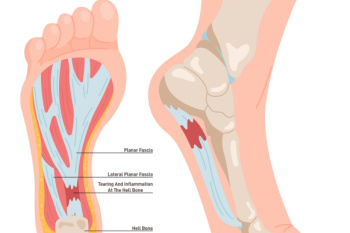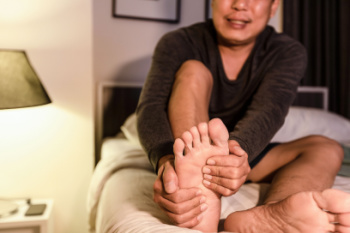Items filtered by date: May 2024
Plantar Fasciitis Is a Degenerative Foot Condition

Plantar fasciitis is a foot condition characterized by inflammation and degeneration of the plantar fascia, a thick band of tissue that runs along the bottom of the foot, connecting the heel to the toes. This condition often develops gradually over time, resulting from repetitive strain and stress on the plantar fascia. Activities that involve prolonged standing, walking, or running, especially on hard surfaces, can worsen the problem. Additionally, factors such as obesity, tight calf muscles, high arches, flat feet, and non-supportive footwear can increase the risk of developing plantar fasciitis. Symptoms include heel pain, particularly in the morning or after periods of inactivity, which can worsen with activity. While plantar fasciitis can be challenging to manage, various treatment options, including rest, stretching exercises, orthotic devices, and in severe cases, corticosteroid injections or surgery, can help alleviate pain and promote healing. If you have persistent heel pain, it is strongly suggested that you consult a podiatrist who can accurately diagnose and treat the cause.
Plantar fasciitis can be very painful and inconvenient. If you are experiencing heel pain or symptoms of plantar fasciitis, contact Donald Manger, DPM from Associated Podiatric Physicians, PA. Our doctor can provide the care you need to keep you pain-free and on your feet.
What Is Plantar Fasciitis?
Plantar fasciitis is the inflammation of the thick band of tissue that runs along the bottom of your foot, known as the plantar fascia, and causes mild to severe heel pain.
What Causes Plantar Fasciitis?
- Excessive running
- Non-supportive shoes
- Overpronation
- Repeated stretching and tearing of the plantar fascia
How Can It Be Treated?
- Conservative measures – anti-inflammatories, ice packs, stretching exercises, physical therapy, orthotic devices
- Shockwave therapy – sound waves are sent to the affected area to facilitate healing and are usually used for chronic cases of plantar fasciitis
- Surgery – usually only used as a last resort when all else fails. The plantar fascia can be surgically detached from the heel
While very treatable, plantar fasciitis is definitely not something that should be ignored. Especially in severe cases, speaking to your doctor right away is highly recommended to avoid complications and severe heel pain. Your podiatrist can work with you to provide the appropriate treatment options tailored to your condition.
If you have any questions please feel free to contact our office located in Hamilton Township, NJ . We offer the newest diagnostic and treatment technologies for all your foot and ankle needs.
The Impact of Neuropathy on Feet

Neuropathy, often silently lurking until later stages of life, can significantly impact foot health. It is a condition characterized by nerve damage, leading to numbness, tingling, and pain in the feet. Causes range from diabetes and infections to injuries and hereditary factors. Neuropathy can manifest in various foot problems, including loss of sensation, burning or shooting pain, and muscle weakness, making simple tasks challenging. Diagnosing neuropathy typically involves a thorough medical history, physical examination, and nerve conduction tests to assess nerve function. Prevention strategies include managing underlying conditions like diabetes, maintaining a healthy lifestyle, and avoiding prolonged pressure or trauma to the feet. While there is no outright cure for neuropathy, treatments focus on symptom management and slowing its progression. This may involve medications and lifestyle modifications. If you are experiencing symptoms of neuropathy in your feet, it is suggested that you consult a podiatrist for a thorough exam and tailored treatment plans.
Neuropathy
Neuropathy can be a potentially serious condition, especially if it is left undiagnosed. If you have any concerns that you may be experiencing nerve loss in your feet, consult with Donald Manger, DPM from Associated Podiatric Physicians, PA. Our doctor will assess your condition and provide you with quality foot and ankle treatment for neuropathy.
What Is Neuropathy?
Neuropathy is a condition that leads to damage to the nerves in the body. Peripheral neuropathy, or neuropathy that affects your peripheral nervous system, usually occurs in the feet. Neuropathy can be triggered by a number of different causes. Such causes include diabetes, infections, cancers, disorders, and toxic substances.
Symptoms of Neuropathy Include:
- Numbness
- Sensation loss
- Prickling and tingling sensations
- Throbbing, freezing, burning pains
- Muscle weakness
Those with diabetes are at serious risk due to being unable to feel an ulcer on their feet. Diabetics usually also suffer from poor blood circulation. This can lead to the wound not healing, infections occurring, and the limb may have to be amputated.
Treatment
To treat neuropathy in the foot, podiatrists will first diagnose the cause of the neuropathy. Figuring out the underlying cause of the neuropathy will allow the podiatrist to prescribe the best treatment, whether it be caused by diabetes, toxic substance exposure, infection, etc. If the nerve has not died, then it’s possible that sensation may be able to return to the foot.
Pain medication may be issued for pain. Electrical nerve stimulation can be used to stimulate nerves. If the neuropathy is caused from pressure on the nerves, then surgery may be necessary.
If you have any questions, please feel free to contact our office located in Hamilton Township, NJ . We offer the newest diagnostic and treatment technologies for all your foot care needs.
Hammertoe in Kids

Hammertoe, a condition where one or more toes bend abnormally at the middle joint, can affect children as well as adults. It typically occurs due to an imbalance in the toe muscles, often exacerbated by wearing ill-fitting shoes or genetic predisposition. Children with hammertoe may experience discomfort, corns, or calluses, especially when wearing shoes. Treatment options for hammertoe in kids vary depending on the severity of the condition. Non-invasive measures such as wearing roomier footwear, toe exercises, and custom orthotic inserts can provide relief. In more severe cases, surgical intervention may be necessary to correct toe alignment. If you have a child who appears to be developing a hammertoe, it is suggested that you schedule an appointment with a podiatrist who can assess the severity of the condition in addition to providing interventions and treatment that can help to alleviate discomfort, prevent progression, and ensure optimal foot health.
Hammertoe
Hammertoes can be a painful condition to live with. For more information, contact Donald Manger, DPM from Associated Podiatric Physicians, PA. Our doctor will answer any of your foot- and ankle-related questions.
Hammertoe is a foot deformity that affects the joints of the second, third, fourth, or fifth toes of your feet. It is a painful foot condition in which these toes curl and arch up, which can often lead to pain when wearing footwear.
Symptoms
- Pain in the affected toes
- Development of corns or calluses due to friction
- Inflammation
- Redness
- Contracture of the toes
Causes
Genetics – People who are genetically predisposed to hammertoe are often more susceptible
Arthritis – Because arthritis affects the joints in your toes, further deformities stemming from arthritis can occur
Trauma – Direct trauma to the toes could potentially lead to hammertoe
Ill-fitting shoes – Undue pressure on the front of the toes from ill-fitting shoes can potentially lead to the development of hammertoe
Treatment
Orthotics – Custom made inserts can be used to help relieve pressure placed on the toes and therefore relieve some of the pain associated with it
Medications – Oral medications such as anti-inflammatories or NSAIDs could be used to treat the pain and inflammation hammertoes causes. Injections of corticosteroids are also sometimes used
Surgery – In more severe cases where the hammertoes have become more rigid, foot surgery is a potential option
If you have any questions please contact our office located in Hamilton Township, NJ . We offer the newest diagnostic and treatment technologies for all your foot and ankle needs.
Why Live with Pain and Numbness in Your Feet?
Treatment for Bunions Including Surgery

A bunion is a bony protrusion at the base of the big toe that can cause significant discomfort and affect daily activities. Luckily, there are various bunion treatment options available to alleviate symptoms and restore foot function. For mild to moderate cases, nonsurgical approaches include wearing wider shoes with supportive soles, using bunion shields and pads, and taking anti-inflammatory medications. Night splints and toe separators may also help correct toe alignment and stretch tight soft tissues. Custom orthotics can address foot mechanics and prevent further progression of the deformity. When conservative measures fail to bring relief, surgical intervention may be necessary. Bunion surgery, or bunionectomy, aims to correct the misalignment of the big toe joint and remove bony growths. This type of surgery is not without risks and may not always be successful. Therefore, early recognition, accurate diagnosis, and appropriate treatment are a must. A podiatrist can help to develop a personalized treatment plan that is best tailored to your needs. If you are struggling with persistent bunion pain, it is suggested that you schedule an appointment with a podiatrist.
If you are suffering from bunion pain, contact Donald Manger, DPM of Associated Podiatric Physicians, PA. Our doctor can provide the care you need to keep you pain-free and on your feet.
What Is a Bunion?
Bunions are painful bony bumps that usually develop on the inside of the foot at the joint of the big toe. As the deformity increases over time, it may become painful to walk and wear shoes. Women are more likely to exacerbate existing bunions since they often wear tight, narrow shoes that shift their toes together. Bunion pain can be relieved by wearing wider shoes with enough room for the toes.
Causes
- Genetics – some people inherit feet that are more prone to bunion development
- Inflammatory Conditions - rheumatoid arthritis and polio may cause bunion development
Symptoms
- Redness and inflammation
- Pain and tenderness
- Callus or corns on the bump
- Restricted motion in the big toe
In order to diagnose your bunion, your podiatrist may ask about your medical history, symptoms, and general health. Your doctor might also order an x-ray to take a closer look at your feet. Nonsurgical treatment options include orthotics, padding, icing, changes in footwear, and medication. If nonsurgical treatments don’t alleviate your bunion pain, surgery may be necessary.
If you have any questions, please feel free to contact our office located in Hamilton Township, NJ . We offer the newest diagnostic and treatment technologies for all your foot care needs.

